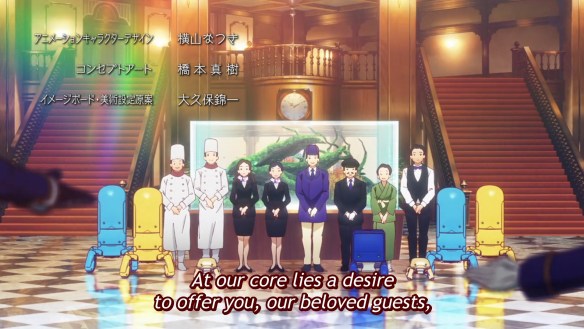Hello folks, and welcome back to Wrong Every Time. Today we’re checking out a fresh spring production that earned a pile of positive buzz, as we explore the first episode of Apocalypse Hotel. The show is an anime-original production (always a good sign) set in a post-apocalyptic world, where humanity has disappeared and only robots tend to our crumbling monuments, including our protagonist and current hotel manager.
It’s really no surprise we’ve been receiving a glut of apocalyptic media lately. Even a cursory glance at global politics will demonstrate that our present world order is in its endgame, and that if humanity survives both this reactionary social moment and our climate crisis, our societies will look significantly different than their current late-capitalist formation. Popular art reflects the psychological consequences of this understanding; some choose exodus from an intolerable reality (isekai), some cling to nostalgia (endless franchises and remakes), and some seek peace with a future that might not include humanity at all, as foretold in apocalyptic travelogues like Girls’ Last Tour and Kemurikusa.
The third of these perspectives seems the most clear-headed to me personally, and I’m thus happy to be embarking on another journey that accepts humanity might not be here much longer. As for our staff, director Kana Shundo appears to be taking a leap from primarily key animation-focused roles, while series composer Shigeru Murakoshi has written extensively for shows ranging from GARO to Zombie Land Saga. The team in general seems well-tuned for a character acting-heavy slice of life/comedy, and the show’s reputation seems to have borne that out. Let’s get to it!
Episode 1
We open with what appears to be a pre-collapse advertisement for the Gingarou Hotel in Ginza. The hotel’s humanoid robots are accompanied by delightful little box-guys that remind me of Ghost in the Shell’s Tachikomas
The comfort and reassurance of this pitch is contrasted against the progress of mankind’s presumed destroyer, a virus that was first discovered in South America
“Make an unforgettable memory with your loved ones.” The emphasis on memory and special events enhances the sense of finality, offering an undertone of “make one last memory while you can”
More parallels between the two lines, as the framing of this hotel as a sanctuary from the rigors of life is contrasted against the building of undersea and space shelters
It’s a familiar yet ever-evocative concept – humanity is fragile, yet we’ve nonetheless sculpted the world in our own image. Our monuments, be they great statues or Viagra ads, will undoubtedly outlast us, and serve as the final word on our species
That image is made explicit by the conclusion here – this Gingarou hotel ad is playing to an abandoned city. Planetarium also effectively played in this exact sort of space
With no one left to tell the time, its passage is conveyed through the return of nature to the city, rising above our proud yet ultimately temporary monuments
By the jaunty horn fanfare accompanying this concierge-robot’s collapse, I imagine we’ll be indulging in that savory “getting along with the hopelessness” flavor of Girls’ Last Tour
We then meet our lead, who’s wandering through a lovingly painted forest scene. The sunlight lends a bright glow to the ground, emphasizing the enduring vitality of the natural world
Nicely textured imagery of the city mid-renewal as our lead walks home. Our art director Kohei Honda started as a background artist, so little surprise there
The water she was collecting was actually to cool down the Doorman Robot – even they are decaying, just much more slowly
The continuity of their uniform’s colors does a nice job of mitigating the aesthetic clash of these CG and traditionally-drawn characters. Plus, robots that aren’t trying to look organic are always a pretty easy choice for CG – they’re supposed to look unnatural, and CG certainly excels at that
“Easy for you to say, Missy, but opening doors is my very purpose.” Though the humans have left, they are still bound by the programming set for them – or alternatively, I suppose you could call it given purpose by that programming
“Don’t try to talk me down. You’ll be late for work.” It seems all of them find purpose in their assignments
Our lead (and apparent acting manager) gathers the team together for the morning meeting. It is April 12th, 2157
Their little robot chirps are extremely cute
The driller robot is absent, and apparently at the “proposed hot springs location.” So are they still planning and executing additions to the hotel?
“Our goal for this month is a total of 1,440 stays. We are 1,440 short.” The contrast of this cheerful recitation and the apocalypse outside really puts the arbitrary nature of much of our labor in stark relief. What do quarterly earnings have to do with the project of being human? Will we regret our professional inefficiencies when the levies break?
Yet rather than addressing the absurdity of their task, the team leaders all just offer minor suggestions about their various personal responsibilities. Perhaps that itself is the crucial reason for these responsibilities – to give us purpose in a world that offers none. Purpose can be its own reward
Pretty good sign that this show immediately has me rambling in my Galaxy Express-style “meaning of existence” mode
She then lists off the ten commandments of Gingarou service, which seem to literally serve as the foundational religious text of their lives, even though the commandments are full of such trite service-oriented bromides as “clean sheets symbolize pure hearts.” But as with the labor itself, a credo does not necessarily need to be inherently meaningful in order to impart meaning; what we put our faith in can be less important than the underlying sustaining of faith
It’s a very fun concept – taking the inherently melancholy image of robots performing tasks long after those tasks have lost their purpose, and twist that into an optimistic message of finding purpose even in a fallen world. Their actions may seem silly to us humans, given we were the ones who originally programmed those tasks for our benefit, but if they’re happily occupied while we lament a lack of purpose, who is truly the wiser?
It sort of reminds me of Nier: Automata, whose robots struggled to become human, not realizing that in embracing that struggle they were already like the humans they idolized
Doorman Robot collapses again. His actions are given greater context by the behavior of the others – how could he possibly disobey his function, when that is how all of them are maintaining pride and purpose? Yet the manager’s deviation from her standard duties in cooling him down demonstrates the actual function of this project: to keep their own community alive
It seems part of the highway collapsed on Driller Robot as he was inspecting the hot springs site. In spite of their efforts, their community cannot truly ignore the apocalypse, and one by one they will ultimately cease functioning. A somber profile shot captures our manager’s goodbye to this old friend
In the context of his death, these tasks immediately take on a more desperate tone. How long will their energy sources continue to power them? How long will their intricate mechanical workings hold up?
“Driller Robot is considered on indefinite leave.” Oh god, this cut is heartbreaking. We shift from her setting his body down to a wide shot, revealing the dozens of trusted companions who’ve already ceased functioning
“We will remain on standby for humanity’s return.” Waiting for the return of their absent god. A motivation they share with a great many humans – as I’ve grown older, I’ve come to realize that most people need to believe in something, to put their faith in something greater than themselves. I suppose I’ve chosen art’s ability to transform and connect us, to teach us curiosity and empathy, but nearly everyone puts their faith in something
The manager “dreams” of the owner’s last goodbye, certain that tomorrow will be the day they return
“A True Hotel is Always Storied.” The last of their ten commandments, which will all presumably serve as convenient episode titles
The rest of the staff suggest Doorman Robot take over the drilling project, but the manager states he must be there to man the door in case of a guest’s arrival. It seems she believes in the hotel’s continuing mission even more than the rest of them – or simply that she’s frightened of losing another friend, one who’s already on the verge of collapse
Today the manager is behind schedule, and her memories contain distorted fragments of a robot in disrepair, though she doesn’t seem to recognize them herself
Excellent faces as she realizes the shampoo hat is gone
“We are faced with the biggest crisis since mankind departed earth over a century ago!”
Interesting how the others always offer makeshift solutions – it’s clear the hotel is more important to our manager than the rest of them
She initiates a Ginza-wide search for a new shampoo hat
Oh my god – Doorman Robot actually took it, because he doesn’t like having water poured in his face, but was too shy to say so. “”That’s just how people are.”
The schedule gives them purpose, but don’t they owe consideration to each other over the demands of the schedule? A clash between their faith and their community, in its own small way
And just when the manager believes the hotel is doomed, a customer at last walks through the doors
It’s some kind of… spore-emitting mushroom creature? Eh, a guest is a guest
And Done
Alright, that was indeed an excellent premiere! We’re definitely luxuriating in all that delicious post-apocalyptic stuff: the melancholy of humanity’s end, the search for purpose in the absence of a future, the question of what we fundamentally owe to and gain from each other. But as in Girls’ Last Tour, the weight of those themes is counterbalanced by the lightness of their presentation; in spite of it all, the Gingarou Hotel is a charming place to visit, whose caretakers are truly ensuring their guests (including us in the audience) are generously cared for. As our own world lurches towards apocalypse, it’s a comfort to find stories that see the storm coming, but find hope in the skies beyond it. If we could all face oblivion with as much grace as the Gingarou staff, maybe we wouldn’t be in this mess in the first place.
This article was made possible by reader support. Thank you all for all that you do.




